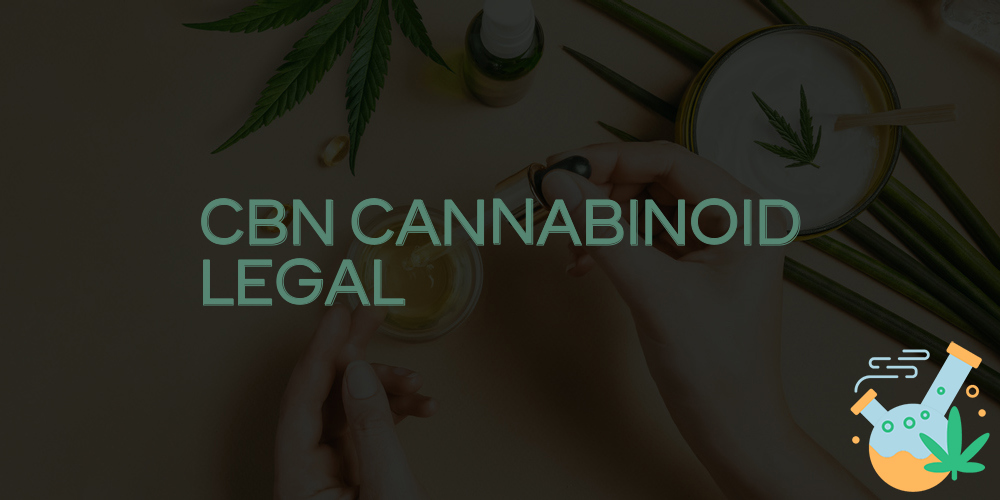Cannabinoids continue to pique the interest of researchers, medical experts, and fans alike. Among the many chemicals contained in cannabis, CBN (cannabinol) has emerged as a hot issue. As CBN’s popularity grows, it becomes increasingly important to manage the complex legal situation around this cannabinoid. Understanding CBN’s legal position is critical for those looking to capitalize on its potential benefits. In this post, we will go over all you need to know about CBN’s legal status, giving you an in-depth explanation of its present legislation. By shedding light on this subject, we hope to give a comprehensive guide that will assist you in smoothly navigating the legal difficulties.

Understanding the Legal Implications of Cannabinoid CBN
The growing popularity of cannabinoids like CBD and THC has created a lot of interest in their potential benefits and legal consequences. CBN (cannabinol) is a lesser-known cannabinoid that has recently gained popularity. As more people become interested in CBN’s possible therapeutic applications, it is critical to understand the legal context around its manufacture, sale, and consumption.
CBN is an organic chemical present in the cannabis plant. CBN is not intoxicating, unlike THC, which is known for its psychoactive qualities. This feature has contributed to its popularity as a non-high alternative to THC for individuals seeking relief from a variety of illnesses. However, its legal standing differs depending on the jurisdiction.
The legal status of CBN is frequently linked to the legal status of cannabis as a whole in many nations, including the United States. The legality of CBN is changing as cannabis laws change. Some states have made the sale and use of CBN, whether for medical or recreational purposes, legally authorized. However, in jurisdictions where cannabis is still banned, CBN, regardless of its psychotropic qualities, may also be considered criminal. To ensure compliance with the law, it is critical to investigate and grasp the relevant rules and regulations governing CBN in your country.
Navigating the CBN Cannabinoid Regulatory Landscape
The regulatory environment surrounding the cannabinoid CBN (Cannabinol) can be complex and ever-changing. As interest in cannabinoids’ potential medicinal advantages grows, it is critical for both businesses and consumers to understand the rules in place. Navigating this terrain demands a full awareness of current legislation as well as maintaining up to date on any changes that may occur in order to assure compliance and prevent legal issues.
The various restrictions across different jurisdictions are one of the hurdles in negotiating the regulatory environment of CBN cannabinoid. While some countries have approved the medical use of cannabis, others still classify them as controlled narcotics. As a result, firms must navigate a complex web of restrictions when making, distributing, or selling CBN goods. Furthermore, even in nations where cannabinoids are allowed, stringent laws governing labeling, dosage, and marketing techniques must be followed.
Furthermore, regulatory organizations frequently fail to keep up with marijuana research and development’s rapid breakthroughs. As new research emerge demonstrating possible advantages, regulatory frameworks may need to be modified to reflect these findings. This might result in frequent changes in legislation, making it difficult for enterprises to remain compliant. Businesses must establish good relationships with regulatory bodies, stay updated about industry developments, and engage in constant dialogue to shape regulations that are both fair and effective in order to traverse this landscape successfully.
Investigating the Current Legal Status of Cannabinoid CBN
CBN, also known as cannabinol, is a cannabinoid present in the cannabis plant. With growing interest in the possible health advantages of cannabinoids, it’s critical to grasp CBN’s present legal status. While the rules governing cannabis and its derivatives differ widely from area to jurisdiction, it is critical to remain aware about the legal framework in your individual locale.
The legal position of CBN in the United States might be complicated. Cannabis, including both marijuana and hemp, is a Schedule I controlled substance under federal law. Several states, however, have passed legislation allowing for the medical or recreational use of cannabis. This has resulted in a hodgepodge of rules across the country, with some states explicitly include CBN in their cannabis programs and others not.
In addition, the 2018 Farm Bill made the production and sale of hemp-derived goods, including cannabinoids like CBD, lawful. However, the legal status of CBN generated from hemp varies depending on state regulations. To determine the legality of CBN in your location, it is critical to contact local legislation or legal counsel. As legislation and regulations evolve, it is critical to be informed about any changes that may affect the legal position of CBN and other cannabinoids.
Exploring the Legal Issues Concerning CBN Cannabinoid
Cannabinoids have received a lot of interest in recent years, with academics and medical professionals looking into their possible benefits. CBN, or cannabinol, is one cannabinoid that has recently sparked interest. However, before digging into CBN’s possible benefits, it is critical to grasp the legal implications of its use.
The legal situation around cannabinoids, especially CBN, remains complex and ever-changing in many nations, including the United States. While some states have legalized cannabis and its derivatives for medical purposes, the federal government still classifies marijuana as a Schedule I substance, rendering it illegal at the federal level. This disparity between state and federal regulations complicates the legal structure regarding CBN for individuals and corporations.
Furthermore, legislation governing the production, distribution, and sale of CBN products vary greatly amongst jurisdictions. Some countries have put in place comprehensive frameworks to govern the manufacture and sale of cannabis, whereas others have not. This lack of consistency complicates the legal considerations surrounding CBN even further, making it critical for individuals and corporations to thoroughly investigate and understand the various legislation in their different locations.
Understanding the legal status of CBN cannabinoid is critical for people who are interested in its potential benefits and applications. As the legal landscape surrounding cannabinoids evolves, it is critical to navigate the legal landscape with caution and keep updated about the individual laws and regulations in your area. Individuals can make educated decisions concerning the use and availability of CBN products by being aware of the legal situation and staying up to date on any developments. To ensure compliance with local regulations, it is always best to consult with legal professionals or specialists in the sector. Finally, recognizing the legal position of CBN cannabinoid allows persons to investigate its possible medicinal qualities within the legal framework.


